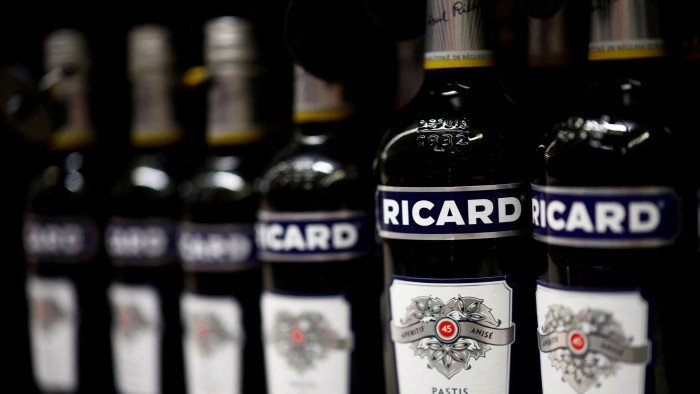Unlock the Editor’s Digest for free
Roula Khalaf, Editor of the FT, selects her favourite stories in this weekly newsletter.
Drinks maker Pernod Ricard is reorganising its business to cut costs and eventually headcount amid a depressed global market for alcohol, the company’s leadership told employees this week.
The maker of Jameson whiskey, Absolut Vodka and Martell Cognac will simplify its structure, centralising some functions and administration, according to people with knowledge of the details, which will eventually lead to some job cuts.
The company will divide its brands into two units. The first will include its whiskey, champagne and cognac brands; the second will include other spirits and aperitifs. No numbers have been agreed on job reductions because the company is just beginning the process of evaluating and negotiating with its businesses, the people said.
Pernod Ricard said: “We work on an ongoing basis to adapt our organisation and ways of working to the fast-evolving business environment. That is why we have announced to all our employees an internal project aimed to create a more agile and simplified organisation.”
The restructuring was first reported by Reuters.
The changes follow a period of depressed sales across the industry as consumers cut their spending on wine and alcohol amid anxieties about inflation and the economy. The sector is also contending with a trend for people to cut down on drinking.
Pernod Ricard’s sales fell 3 per cent in its most recent quarter, pulled down by sharp declines in sales of Martell cognac in China. Stockpiling in the US ahead of Donald Trump’s April tariff announcements was not enough to offset this, and US sales also declined in the quarter.
Last month, Pernod Ricard rival Moët Hennessy, which is owned by LVMH, told staff it would reduce headcount by around 13 per cent — around 1,200 jobs — in the coming years to adapt to the market downturn. Moët has been cutting its marketing and travel budgets since mid-2023, as well as trying to reduce head count.
Diageo, the world’s largest spirits group, announced in May that it was reviewing its portfolio to identify “substantial” disposals. It also unveiled a $500mn cost-cutting programme it hopes will deliver $3bn in annual cash flow from next year.
Diageo has come under pressure from investors to improve its performance and reduce its leverage.
The Smirnoff and Johnnie Walker owner scrapped its medium term sales target at its half year earnings in February in response to weak demand and uncertainty caused by US tariffs.
